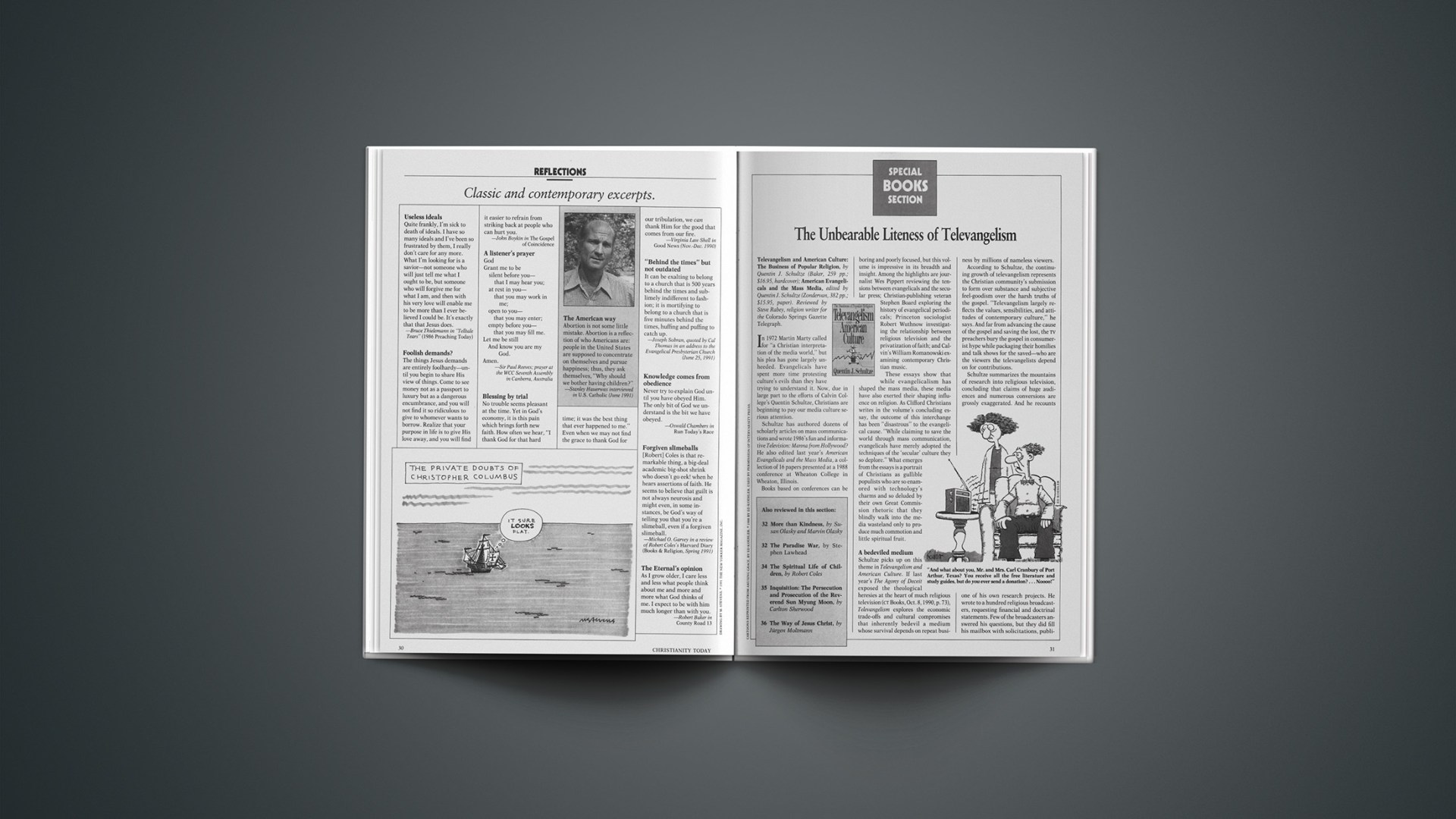Televangelism and American Culture: The Business of Popular Religion, by Quentin J. Schultze (Baker, 259 pp.; $16.95, hardcover);American Evangelicals and the Mass Media, edited by Quentin J. Schultze (Zondervan, 382 pp.; $15.95, paper). Reviewed by Steve Rabey, religion writer for the Colorado Springs Gazette Telegraph.
In 1972 Martin Marty called for “a Christian interpretation of the media world,” but his plea has gone largely unheeded. Evangelicals have spent more time protesting culture’s evils than they have trying to understand it. Now, due in large part to the efforts of Calvin College’s Quentin Schultze, Christians are beginning to pay our media culture serious attention.
Schultze has authored dozens of scholarly articles on mass communications and wrote 1986’s fun and informative Television: Manna from Hollywood? He also edited last year’s American Evangelicals and the Mass Media, a collection of 16 papers presented at a 1988 conference at Wheaton College in Wheaton, Illinois.
Books based on conferences can be boring and poorly focused, but this volume is impressive in its breadth and insight. Among the highlights are journalist Wes Pippert reviewing the tensions between evangelicals and the secular press; Christian-publishing veteran Stephen Board exploring the history of evangelical periodicals; Princeton sociologist Robert Wuthnow investigating the relationship between religious television and the privatization of faith; and Calvin’s William Romanowski examining contemporary Christian music.
Also reviewed in this section:
More than Kindness, by Susan Olasky and Marvin Olasky
The Paradise War, by Stephen Lawhead
The Spiritual Life of Children, by Robert Coles
Inquisition: The Persecution and Prosecution of the Reverend Sun Myung Moon, by Carlton Sherwood
The Way of Jesus Christ, by Jürgen Moltmann
These essays show that while evangelicalism has shaped the mass media, these media have also exerted their shaping influence on religion. As Clifford Christians writes in the volume’s concluding essay, the outcome of this interchange has been “disastrous” to the evangelical cause. “While claiming to save the world through mass communication, evangelicals have merely adopted the techniques of the ‘secular’ culture they so deplore.” What emerges from the essays is a portrait of Christians as gullible populists who are so enamored with technology’s charms and so deluded by their own Great Commission rhetoric that they blindly walk into the media wasteland only to produce much commotion and little spiritual fruit.
A Bedeviled Medium
Schultze picks up on this theme in Televangelism and American Culture. If last year’s The Agony of Deceit exposed the theological heresies at the heart of much religious television (CT Books, Oct. 8, 1990, p. 73), Televangelism explores the economic trade-offs and cultural compromises that inherently bedevil a medium whose survival depends on repeat business by millions of nameless viewers.
According to Schultze, the continuing growth of televangelism represents the Christian community’s submission to form over substance and subjective feel-goodism over the harsh truths of the gospel. “Televangelism largely reflects the values, sensibilities, and attitudes of contemporary culture,” he says. And far from advancing the cause of the gospel and saving the lost, the TV preachers bury the gospel in consumerist hype while packaging their homilies and talk shows for the saved—who are the viewers the televangelists depend on for contributions.
Schultze summarizes the mountains of research into religious television, concluding that claims of huge audiences and numerous conversions are grossly exaggerated. And he recounts one of his own research projects. He wrote to a hundred religious broadcasters, requesting financial and doctrinal statements. Few of the broadcasters answered his questions, but they did fill his mailbox with solicitations, publications, and prayer cloths.
Some of Schultze’s claims—such as the claim that televangelism is a major force in both the emergence of the modern megachurch and the trend for some congregations to focus on entertainment value rather than on Christ and historic creeds—are hard to verify. Other thinkers, like cultural critic Neil Postman, view religious broadcasting and other symptoms of “lite” Christianity as symptoms of a much more insidious transformation in the way contemporary people think, believe, and live in a postverbal age.
But Schultze’s concluding chapter should be required reading for every Christian. It provides solid biblical guidelines for calling religious broadcasters to accountability, challenges individual Christians as well as the Christian media to be more critical and selective in their support of religious broadcasters, and calls Christian educators to “address the implications of living in the television age.” Maybe Christian leaders who failed to heed Martin Marty’s challenge nearly two decades ago will hear Schultze’s impassioned plea.










